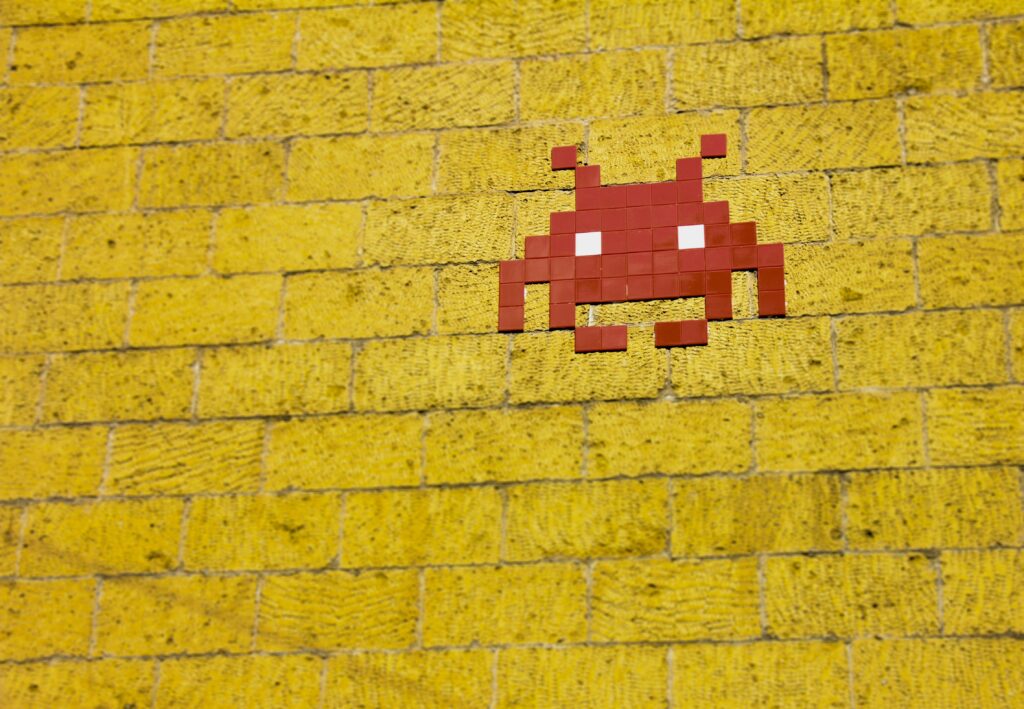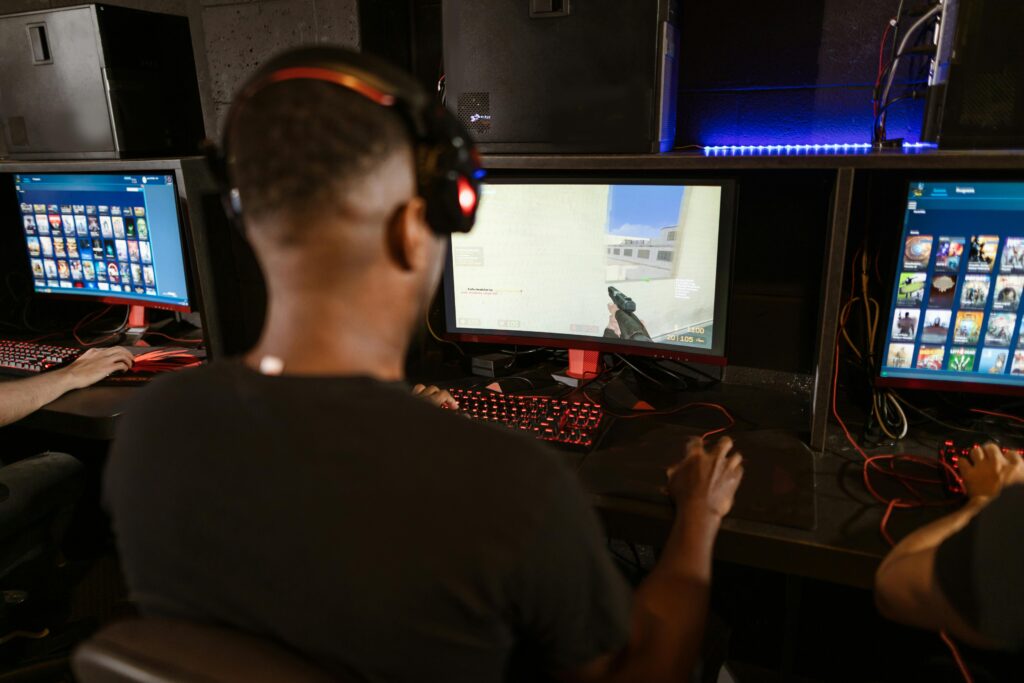I can remember when I presented to a group of mental health providers of varying degrees and backgrounds back in 2022, I had a mission: to inform them about what video games actually are, to destigmatize games amidst a culture that is healing from harmful gaming rhetoric, and to highlight the utility of gaming in peoples’ lives. This included a section on how, in 2018, the International Classification of Diseases’ 11th revision (ICD-11) had included Gaming Disorder as an empirically-based diagnosis, with scarce substantial evidence supporting its etiology.
The year is 2025 and I continue to read messages about how video game addiction is alive and well. Subreddits such as /r/StopGaming/ are aimed at helping gamers break free from their addictions for a chance at a more balanced, enjoyable life. Mental health clinics and providers have begun marketing themselves as experts on “treating gaming addiction.” In 2019, Trump blamed mass shootings on “the glorification of violence in our society,” mainly pointing the finger at video games being a primary contributor. While all three of these points are vastly different from one, they connect a common thread: how societal discourse is still healing from a belief that video games are dangerous, and can be harmful for others.
I write this blog post with the intention to help you, the reader, consider how some systems within some video games have been designed to influence us and have us revisit harmful gameplay loops. I also want to encourage you to discard the absolutely shame-based, ableist, and uninformed rhetoric that has been perpetuated by the World Health Organization (WHO) and many others who claim Gaming Disorder, as it is currently defined, is an “actual disorder.” Lastly, I truly hope you will consider the utility and benefits of playing video games for you and/or your loved ones; to approach gaming with a sense of curiosity and to know what questions you might ask to gain further knowledge about video games and their purpose in our lives.

Gaming Disorder, coined by the WHO and quantified within the ICD-11, is a mental health disorder that is diagnosed in individuals who exhibit “impaired control over gaming, increasing priority given to gaming over other activities to the extent that gaming takes precedence over other interests and daily activities, and continuation or escalation of gaming despite the occurrence of negative consequences.” Various scholars within related domains of video game and technology use have actively spoken out against Gaming Disorder’s inclusion in the ICD-11, highlighting that the criteria of Gaming Disorder have been lazily transposed from those of Substance Use Disorder, that the research quality base for conceptualizing the disorder was poor with low sample sizes (low numbers of participants to pull data from), and that there were no dominant consensus on neither the symptoms nor how to accurately assess for Gaming Disorder at the conclusion of the research. After reading up on the criteria and the authors’ critique, I personally was left to wonder how many on the ICD-11 committee who approved Gaming Disorder had actually played video games themselves, or at least had a working knowledge base about how many different genres and ways of engaging with video games there are.
Much like in modern American psychology’s Diagnostic and Statistical Manual of Mental Disorders (DSM; and every iteration of it), there is a supreme lack of context when quantifying these symptoms (of Gaming Disorder) in the ICD-11, as well as no distinct, agreed-upon definition of what type of gaming is being observed. This reminded me when, back in 2023, I read a book titled Lost in a Good Game by Pete Etchells. In his book, Etchells imparted onto me a profound bit of information: there currently isn’t a standardized, agreed upon, or conceptually shared understanding of what the term video game means in both scientific literature and in everyday society. I had some fun last week and decided to randomly ask several of my closest friends what the term video game means. Here are their responses:
“I guess to me it’s entertainment and an outlet for not having to think about other things. Kind of like a stress reliever. Maybe like 10-20 years ago, it was mainly just for fun, since we were younger and didn’t really have the stresses of adult stuff.”
“Any game that can be played with a controller and is projected on a screen?”
“That’s genuinely hard for me to put into words I come to find out. It’s an escape from stress, along with social interactions that I don’t get in real life, even if they are mostly negative these days. It’s a tool to help me switch off my struggle for a while and live in a fantasy story for a minute.”
“It’s changed a lot in the last 40 years, but in its current incarnation I say it’s any digital game. Just it has off shoots in every direction like a tree, the main branches splitting between consoles, PC, handhelds, phone. Genres being even future branches but I think addiction is more escapism to be honest. Just it’s easier to label as an addiction.” [goes on to explain their previous life challenges and using World of Warcraft as a way to cope with and escape them]
“I think a video game is a virtual world where people take on alternate personalities to create success.”
“A game with video.”
“To me, a video game is a digital interactive experience that allows people to explore fabricated worlds or interfaces made by others. It’s a popular form of escapism.”
“I’d say any game that’s played primarily (if not entirely) through a computer (even if that computer is a game console, phone, computerized toy, etc). Even playing a game on board game arena, those are now video games, even if they’re more literal translations of board games.”
“Any digital interactive entertainment.”
In these responses, I’m noticing themes of escapism, coping, building success, having fun, interacting with something (game, others, game world, etc.), and the definition being tied specifically to the hardware / physical materials one is referencing.
The varied responses from my friends pair well with the aforementioned scholars’ debate on a lack of consensus regarding symptomatology for Gaming Disorder. If you’d ask me for a personal definition, a video game is any form of game you can play on a screen. Someone else might argue against that and say playing games on www.boardgamearena.com could either be playing a board game, or simply a game, instead of video games (funnily enough I wrote this sentence before my friend gave me his quote above). I understand this is a semantics argument, but having a universally recognized label for anything in our culture is how we can accurately discuss and study it. The point I’m trying to prove here is that we need to distinctly identify what we are referencing when we say things such as “video games are addictive,” or, “I play video games casually.” What are you actually doing when gaming?

Video games historically have suffered from a lack of understanding in greater society as well. They bore the brunt of moral panic in the United States, just as many newer technologies have throughout human history. When the 1999 Columbine shootings happened, many were claiming violent video games were a primary culprit leading up to the shooter’s decision to commit mass murder. This same slander continues to happen in more recent times unfortunately.
Let’s pretend we all have the same working definition of what a video game is. Great! So now that we have defined it, we can safely say all video games, and behaviors occurring within them, are the same right? Of course not. Whenever I am having a conversation with someone about video games as an immensely diversified form of media, I use World of Warcraft (WoW) and Candy Crush as distinct comparisons. WoW being a massive multiplayer online roleplaying game (MMORPG) and Candy Crush being a match-3 puzzle game, these two games share little in common based on their genres and origins (MMORPGs starting in 1996 and match-3 puzzle games in 1985). Consider how a player who spends many hours on either of these games is doing something entirely different with each game’s defining gameplay features. Yes, each player would be “playing a video game,” if we were to simply observe them and oversimplify what’s happening. Adding another layer, wouldn’t it also be important for us to understand how each hypothetical player of these games interacts with them?
This is where we can get more exploratory with the behavior of “gaming.” Here’s a breakdown of how two different people could be playing these games (and forgive me, I’ve only ever dabbled in both WoW and Candy Crush):
- The WoW player spends 4 hours a day role-playing (RP) on an “RP server” as various in-game characters who mirror original characters they’ve created in one of their friends’ Dungeons and Dragons campaign, interacting with others online. They’ve met two close, now-lifelong, friends from this type of gaming and routinely log on to quell their boredom, connect with others, and even try out new characters to explore personal aspects of themself.
- The Candy Crush player mostly plays in the morning and evening, often wanting to complete daily quests to feel a sense of accomplishment while also trying to beat their friend’s personal best score. They have a love-hate relationship with the game, getting frustrated when they lose and only started playing it three months ago. They currently average around 3 hours a day in total.
Both of these players are having unique experiences with the games they’re playing. How they are choosing to engage within the systems (and with other players) in these games can evolve over time. These hypothetical examples display how complex “playing a video game” can get if you explore why, how, when, and with who someone is gaming.

Revisiting the ICD-11’s Gaming Disorder criteria, let’s focus on the hypothetical WoW player again with added details to their story, attending more to potentially negative consequences from their behavior:
- The WoW player sometimes forgets to eat or finish their laundry while playing, wishes they “didn’t spend so much time on the game and had more friends in real life,” and has tried to find alternatives for self-care and connecting (but nothing seems to “stick” as much as WoW).
I can see the mental lights turning on for many mental health providers when they read that description. This person clearly wants to reduce their gaming, yet struggles to. We can also see direct consequences resulting from their behavior. But what if this person in general struggles with their interoception and has difficulties with some executive functions, such as task switching and self-monitoring? If we didn’t ask more about their daily life and personal challenges, we would be quick to attribute them specifically to their video game play and attribute the gaming behavior to primarily “causing these problems.” This player might have also been shamed for their gaming in the past and been told that they need to “get out more and meet people” while never being given the opportunities or safe people to connect with. They might also be neurodivergent and lack avenues to communicate and find local people to spend time with who understand them and affirm their ways of relating. Thus, the words the words this person chose to describe their gaming and/or themselves may be heavily influenced by how others have spoken to them, and subsequently create unwanted negative consequences (such as reinforced shame, self-doubt, self-judgment, or a lack of curiosity into why they are playing their game).
If someone decides they have a problem and wants to address changing it, then I, as a mental health provider, am an advocate toward that change entirely. However, I have grown accustomed to also recognizing and openly discussing when any desire to change one’s self and/or behavior may be rooted, as a part or whole, in a history of oppression, internalized shame and ableism, and potentially black-and-white, all-or-nothing thinking that many of us can default to when in emotional distress. Therefore my kind reader, I am letting you know that at this point in my career as a psychologist, I cannot unsee how harmful addictive gaming rhetoric and alarmist societal stigma have ingrained negative beliefs about gaming for both the people deciding to play them or not. I myself went through a period in my life (in my early 20s) where I felt gaming was the source of many of my issues and wanted to swear it off entirely for a few months (I am grateful I didn’t).
Earlier I mentioned interoception and executive functioning differences for our WoW player. These and other challenges, needs, and traits are common for both Autistic and ADHD folks (if you thought I wasn’t going to include neurodivergence in this blog post, you haven’t seen the rest of my website). When people are trying to cope with issues such as consistent emotional dysregulation, a lack of connection, and/or oppressive environments, they may default to habits and routines to soothe themselves. These may be to directly meet their own needs or to simply distract themselves from these stressors. If neurodivergent gamers benefit from visual or auditory stimulation, a sense of autonomy or control, engaging in their hyperfixation to stimulate themselves, or communicating in ways that aren’t predominantly concerned with small talk, eye contact, or being in-person, then video games and the multitude of ways to play them may be serving those needs.
In personal and professional conversations, I’ve made it a point to openly discuss video games as media that can enrich our lives in addition to the potential concerns we have about them. I do this as a gaming psychologist and a video game advocate, who grew up recognizing how shameful and misunderstood his favorite form of media was in the society he lived in, and who now seeks to reclaim that narrative and form it into something more comprehensive and human. When we drop shame and fear from the gaming discourse, we can safely examine them with that same sense of curiosity I mentioned earlier.
If you’re unaware of what potential harmful design choices in games are out there, I recommend you take a look at Dark Pattern Games as a start, where you can learn about which systems might be present in the games you or your loved ones are playing. Design choices such as loot boxes, playing by appointment, daily rewards, and more are being implemented in many games each day, particularly mobile games and popular free-to-play titles. As the video game industry evolves, many new models of play and engagement continue to develop and unfold. Newer systems that try to grab our attention, time, and money more easily will continue to proliferate – Games as a Service as an example has received negative criticism from gaming critics and players alike. We should strive to be aware of who is designing the games we play, why they choose to implement certain systems, what we gain from playing these games, and how the game’s design can actively help or harm us.
To wrap things up, my parting suggestions are to help us counter our negativity bias that will most certainly continue to be salient in discussions about video games being potentially addictive. First, if you have mostly negative beliefs about gaming, recognize that video games are a positive activity for many people; folks have jobs in the gaming industry and people have met friends and partners in their games. Video games can tell magnificent stories that inspire us and they can help us gain a sense of personal accomplishment or healthy pride. We are all capable of understanding and recognizing how to play games in healthy, balanced ways that work for us, especially if we have others to talk about them with.
Second, if you or a loved one are gaming currently and feel that you or they are struggling with the behavior, consider developing a self-reflective practice around it. A player might ask themselves why they are playing video games (and specifically which games), what they are benefitting from within their gameplay, and what they are coping with in their life. You or your loved one can explore your Gamer Motivation Profile on Quantic Foundry’s website to see what motivates you to return to gaming and what you may be deriving from it. You might also keep a journal in which you reflect on your gaming and recognize any shame-based thinking you have around it, as well as what positives you are deriving from your gaming. If you have unaddressed needs or unresolved issues from your past, consider seeing a mental health provider, speaking with a loved one, or investing in other forms of self-care in addition to your gaming. Parents and guardians, please speak with your children about the games they play and listen to them with an open, curious mindset. Learn about the games, genres, and systems within the games they’re playing. Adults, consider how video games have been healthy or positive for you, and diversify your ways of coping, relaxing, and re-energizing to meet your spiritual, emotional, social, and physical needs.

As for myself, I’ve come a long way since I started playing video games around 7-years-old (I honestly can’t remember exactly what age). I’ve tried speed-running games back in 2011, have fully completed some for 100% achievements, joined groups and guilds in MMORPGs, explored different games to challenge myself, played fighting games competitively, and most recently have become enthralled by the roguelike genre. It took until I was a licensed psychologist to admit to everyone outside of my closest circle that I loved video games and wanted to help others who play them. Now I’m fully committed to understanding what healthy gaming means for each person I meet. Everyone is capable of coming to a healthy conclusion about the utility and/or potential harm video games present for them, particularly the more we can come together to discuss them without shame or fear.



